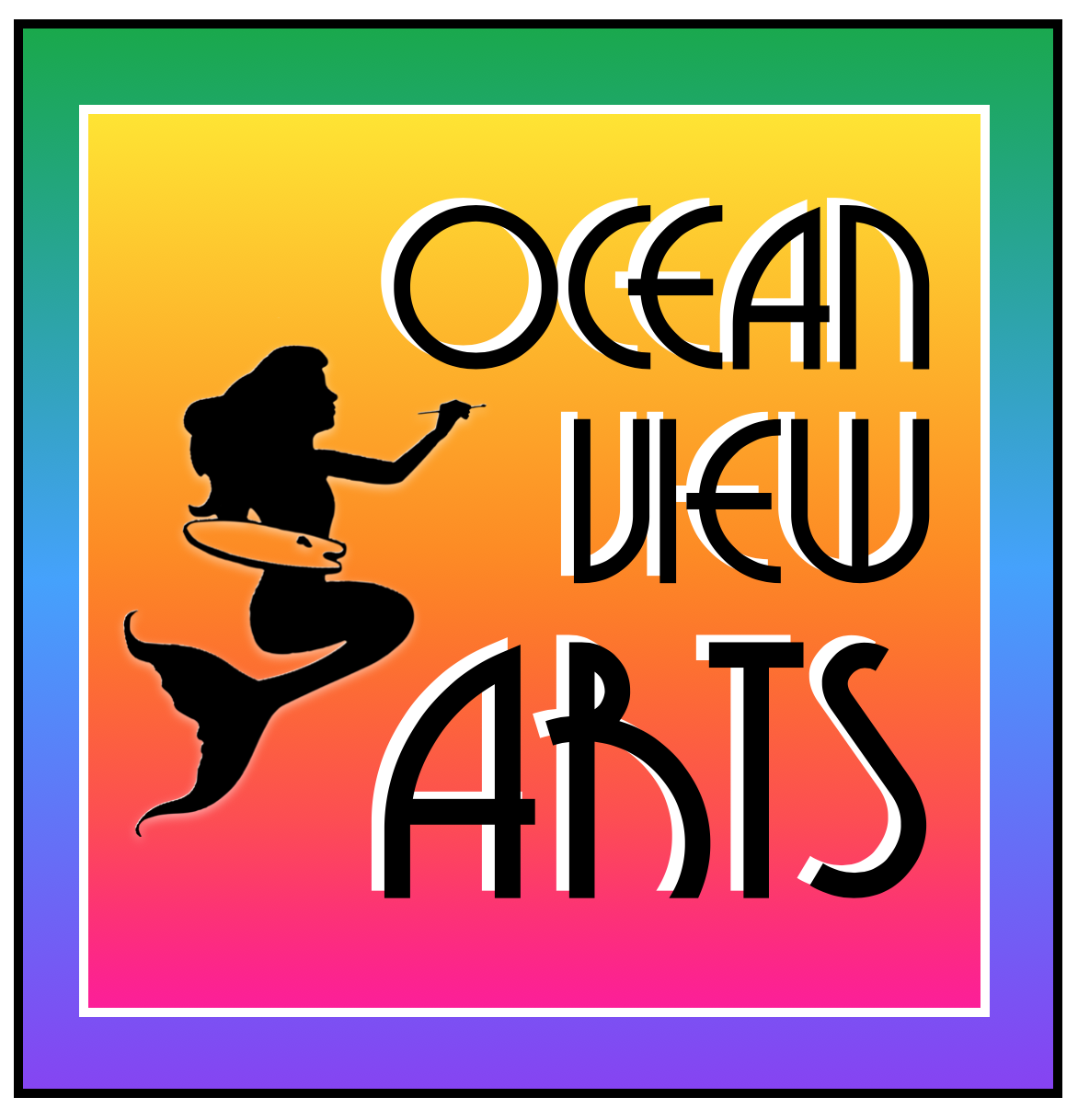Ocean View Arts Land Acknowledgement
In honor of the original stewards of the land where Ocean View Arts (OVA) is located, in Ocean View, Norfolk, Virginia; we acknowledge the Lumbee and Chesapeake tribes and other peoples of the Powhatan Tribes (including nearby Nansemond peoples).
This linked map shows their ancestral lands prior to their displacement by disease, war, enslavement and colonization.
The U.S.Government currently recognizes 574 Indigenous tribes. Today, there are over five million Native Americans in the United States, 78% of whom live outside reservations.
According to Wikipedia, All of the Commonwealth of Virginia used to be Virginia Indian territory. Indigenous peoples have occupied the region for at least 12,000 years. Their population has been estimated to have been about 50,000 at the time of European colonization… Few written documents assess the traditions and quality of life of some of the various early tribes that populated the Virginia region.
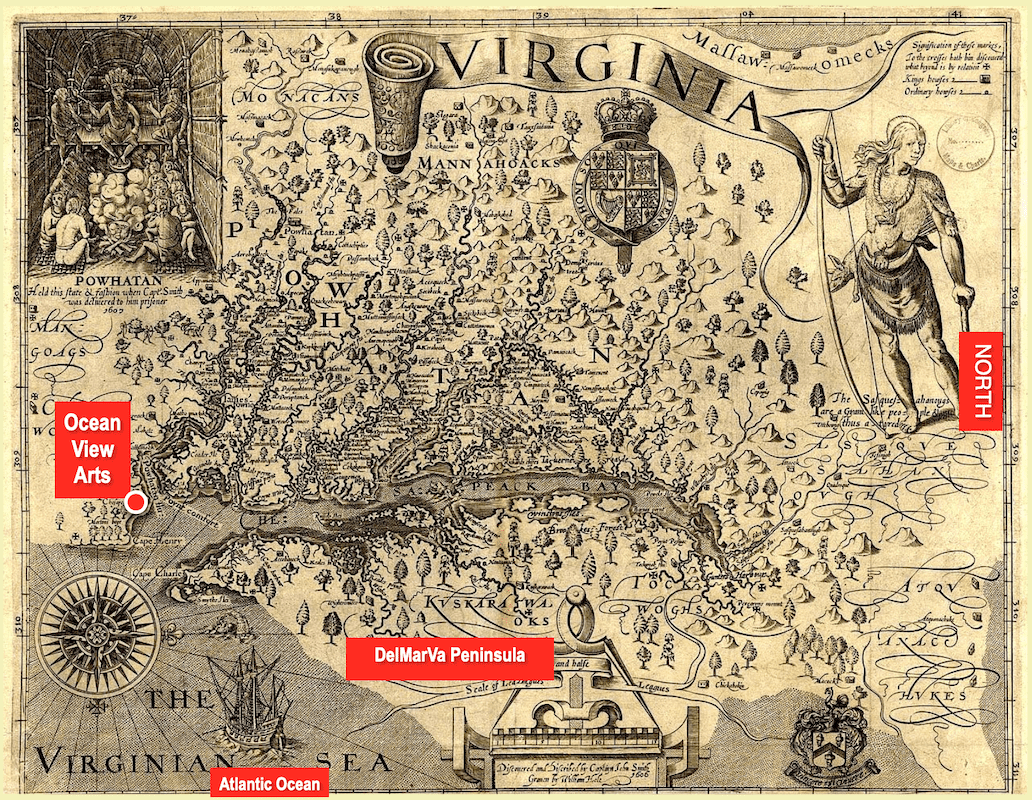
Between September 1608 and August 1609 Captain John Smith led an exploration along the rivers of Virginia and the Chesapeake Bay, during which he became the first English explorer to map the Chesapeake Bay area, documenting hundreds of American Indian communities. Today, sites on his map are archeological treasures and sacred sites for tribal citizens. He played an important role in the establishment of the colony at Jamestown, Virginia, the first permanent English settlement in North America, in the early 17th century. He was a leader of the Virginia Colony between September 1608 and August 1609, and he led an exploration along the rivers of Virginia and the Chesapeake Bay, during which he became the first English explorer to map the Chesapeake Bay area.
The histories of Virginia and the United States have been complicit with the racism of white supremacy, and these difficult histories live on in present-day racial realities and privileges.
OVA acknowledges that as society works toward diversity, equity, and inclusion, we must decolonize our perspectives and systems and honor indigenous wisdom. Colonizers not only damage those they victimize, but in the universal dance of karma, they damage themselves and, indeed, all of civilization by forcing the template of patriarchy upon more balanced and harmonious societies.
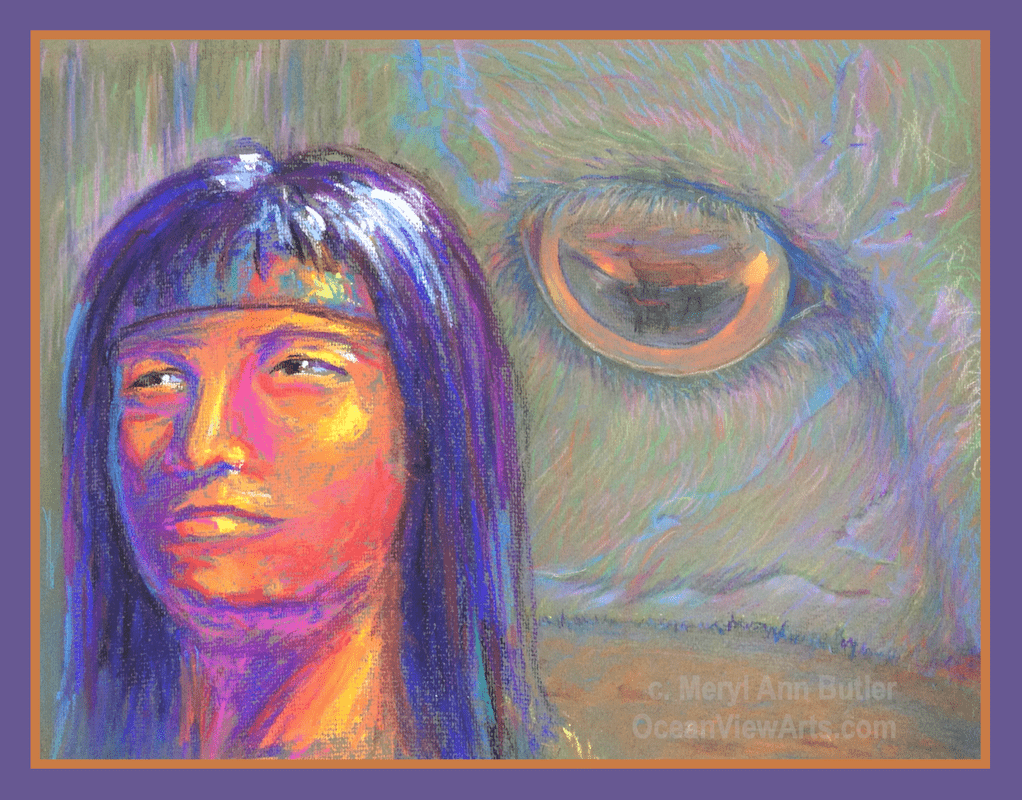
Cockacoeske and Her Visions (Chief of the Pamunkey Tribe). Pastel by Meryl Ann Butler. Cockacoeske (ca. 1640 – ca. 1686) reigned for 30 years as Chief of the Pamunkey tribe in Virginia, replacing her husband after he was killed. She worked with the English colony and maintained the peaceful unity of several tribes and was the first of the tribal leaders to sign the Virginia-Indian Treaty of Middle Plantation. In 2004 Cockacoeske was honored as one of the Library of Virginia's "Virginia Women in History". In this pastel I imagine her spiritual vision which includes three eagles, two deer and a bobcat.
OVA acknowledges the injustices done to people of color, be they Indigenous, Black or other POC, during the unconscionable eras of enslavement and segregation in this geographic area. OVA acknowledges as well continued injustices based on race, color or other prejudices in the U.S. and around the world, while supporting the evolution toward greater harmony and enlightenment.
We must remember that those who have inherited privilege, have, with it, inherited responsibility.
We all have opportunities to help dismantle racism and other prejudices as we evolve toward harmony and wholeness. These opportunities come in small but significant daily interactions, as well as in other ways, such as group activities for change and in the production of works of art that open minds and hearts. The arts are powerful catalysts for change and much, perhaps all, evolutionary change has been launched by the creative works of writers, musicians and artists.
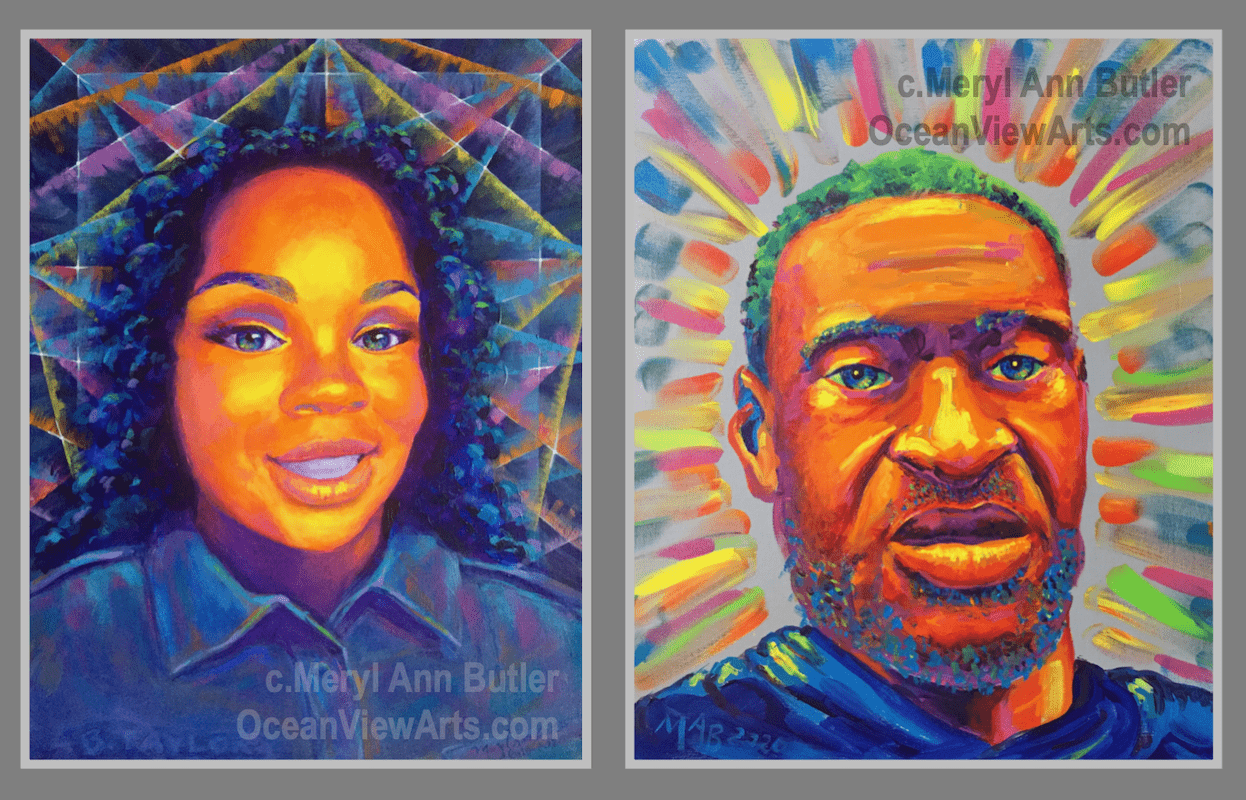
(Left) “In Memoriam: Soul of Light—Breonna Taylor” was completed on Juneteenth, 2020. A Statue of Liberty-style crown of light encircles her head. A 26-year-old EMT, she was fatally shot by Louisville Metro Police Dept. plain-clothed officers on March 13, 2020. (Right) “In Memoriam: Soul of Light: George Floyd” was completed on the weekend of his death in May, 2020; I painted it as a path to healing for myself and viewers.
Statements from The Honor Native Land Campaign
Acknowledgement is a simple, powerful way of showing respect and a step toward correcting the stories and practices that erase Indigenous people’s history and culture and toward inviting and honoring the truth. HNL is an assertion that we are all connected to the earth, the water, the air, the cosmos, and each other. Our destinies are intertwined in this moment of change. We join together, as collective liberators, promoting and creating change that honors all living beings. We lead with hearts, minds, and creativity, knowing that policies and governments will follow.
While other countries have addressed, and reconciled the centuries of injustice and violence that colonialism has wrought on their indigenous peoples; the Americas have struggled from the highest positions of power to unite and discuss a true national effort of reparations to a history of erasure. Through introducing this acknowledgement, and asking others to do the same, we begin to normalize a simple yet radical act that can pervade cultural and societal understanding and trigger a dialogue that can eventually pervade the highest powers in the land.
Acknowledgment by itself is a small gesture, it becomes meaningful when coupled with authentic relationship and informed action. This beginning can be an opening to greater public consciousness of Native sovereignty and cultural rights, a step toward equitable relationship and reconciliation.
Interview with Diana Cournoyer
Diana Cournoyer, executive director at the National Indian Education Association and a member of the Oglala Sioux Tribe, says that while conversations about Indigenous history can be uncomfortable, at the same time, they should include Indigenous joy.
“Native people exist in pride today,” Cournoyer tells NBC’s online Today, “We are thriving, we are innovating, we are creative, we are problem solvers, we are economic drivers in a lot of states, we make decisions, and we are highly educated.”
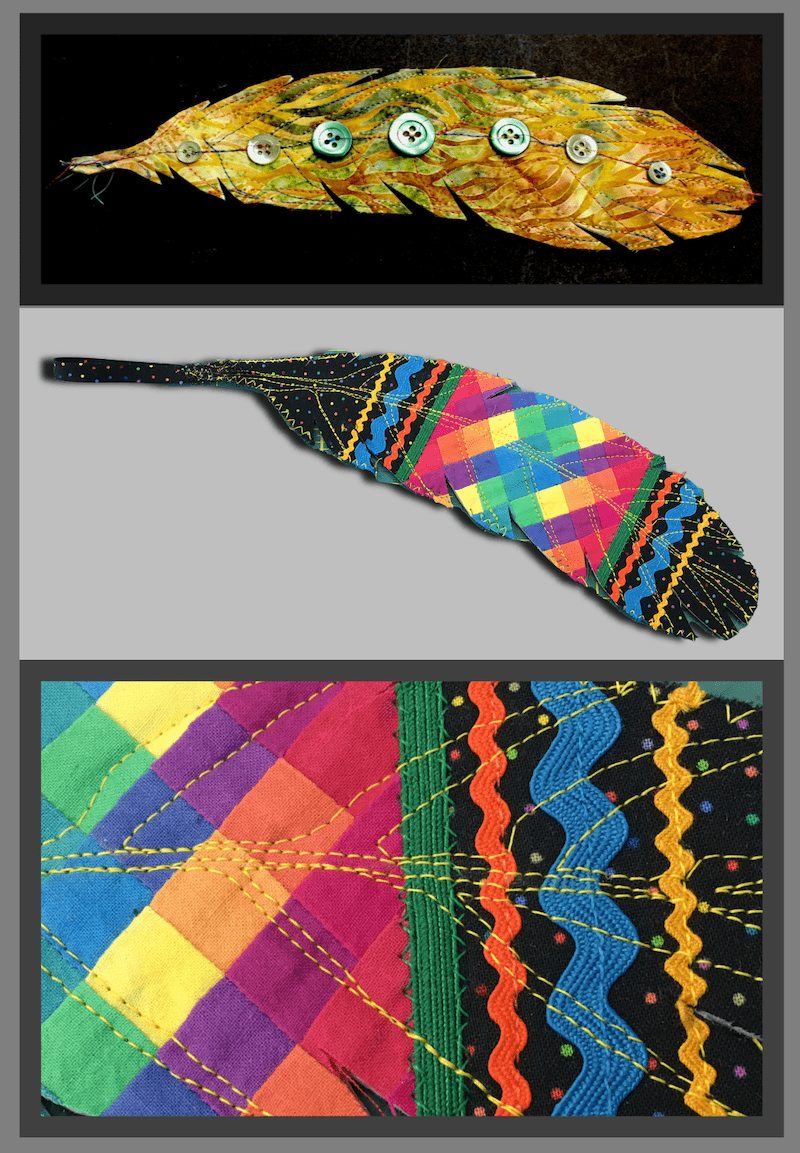
Two of the fabric feathers I made for the AWARE ’22 Exhibition Feather Project curated by Maggie Kerrigan and held at the Virginia Beach Art Center/The Artists Gallery, Virginia Beach, honoring Indigenous people, especially those of of Virginia.
Native Land Digital
Christine McRae, executive director of Native Land Digital, the nonprofit behind the Native Land Digital app, notes, “We now have a global map of Indigenous territories, languages and treaties.” Using either the mobile app or the desktop website, users can input their address or click on a specific area of the country and find links to educational materials that can help them learn about specific Indigenous Nations and their languages, treaties, culture and history.
“[The map] is supporting Indigenous peoples as they take back the narrative, and have both the ability and the platform to be able to share their stories,” McRae added. “In doing so, we’re able to know a truer history of the place that we live in.
“We have a responsibility to learn the history so that we don’t continue to perpetuate harm,” she says. “We’re having more and more of those conversations, and I’m very hopeful listening to a lot of youth from around the world who are incredible advocates and who make sure we take care of the land that we’re on, and who make sure that this land remains for future generations.”
I appreciate the opportunity to develop this Land Acknowlegment Statement and all I learned as I researched it. I invite you to explore this insightful path as well.
Researching forgotten history and pursuing the development of a land acknowledgment statement can launch us forward toward building a more loving, balanced and creative society as we and future generations move forward.
Because few accounts are available of pre-colonization history, discovering the details that support Land Acknowledgement continues as a work in progress. If you know of additional information which perhaps should be added or edited in this statement, I am very interested, please contact me.
A particularly appropriate moment to focus on Land Acknowledgment is Indigenous Peoples’ Day, an annual event honoring the Indigenous people of the United States, which occurs on the second Monday of October.
